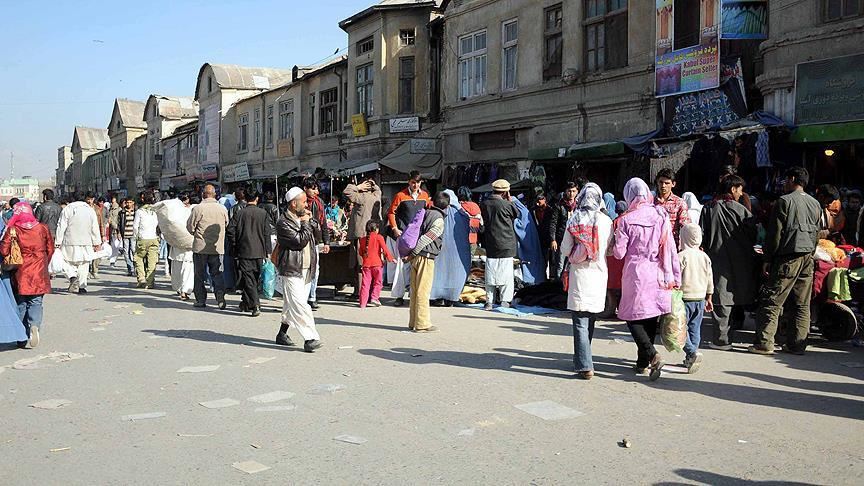COVID-19: War-weary Afghans grapple with panic buying
Border closures amid fears about spread of coronavirus lead to skyrocketing prices of basic commodities in Kabul

KABUL, Afghanistan
In the midst of a creepy coronavirus pandemic, war-weary Afghans found themselves grappling with another grim dilemma -- skyrocketing prices of basic commodities as officials blamed hoarding and panic buying.
For the landlocked country going through a political crisis and years of raging insurgency, border closures - this time over fears of coronavirus, trigger bitter memories from the past causing panic.
Bringing back haunting memories
The capital Kabul's main "Mandawi " market -- which is otherwise only frequented by local vendors and small scale traders from neighboring provinces for wholesale purchase -- has been offering chaotic scenes of panicked citizens bargaining hard for domestic purchase and fiercely arguing over a sudden surge in prices for basic commodities, particularly flour, ghee and sugar.
"There is no fear of Allah among these unjust and opportunist traders," said Deen Mohammed, a retired school teacher, as he bought a 49 kilograms (108 pounds) of wheat-flour sack for 2,200 Afghans [on March 17].
"Only a few days ago I bought the same for 1,400 Afghans", he told Anadolu Agency while drawing parallels between the current panic among the masses with that of the civil war in the 1990s.
Back in the days, he recalled, rival Mujahedeen factions' war for turf ruined the capital and left the population starving amid the closure of trade routes.
The country's present political landscape remains equally unstable and heavily polarized in the wake of troubled presidential polls last year with the incumbent President Ashraf Ghani -- declared winner of the polls -- and his rival candidate Abdullah Abdullah -- self-declared winner -- taking oath for the top office earlier this month.
Now, with Pakistan and Iran shutting their borders with Afghanistan amid fears of the novel coronavirus known as COVID-19, the Mandawi traders in Kabul find themselves caught between a rock and a hard place.
Blaming sudden surge in demand mainly driven by panicked buyers and glitches in the supply chain, they were effectively enraged in an apparent cat and mouse chase with the vigilante police and municipality teams controlling the prices.
"You tell me the solution to this situation, yesterday [March 16] I sold a wheat [49 kg bag] for 1500 afghanis [$19.6], today I am getting it from suppliers for 2,200 afghanis [$28.8], how can I sell it for 1,400 afghanis [$18.3]?"Sami Uddin, a vendor said briefly as he rushed back to the crowd of customers with his ever ringing mobile phone attached to an external battery.
The traders' main body, Afghanistan Chamber of Commerce and Industries, has been blaming "market factors", mainly sudden surge in demand and border closures for the price hike.
But Finance Ministry spokesman Shamroz Khan told Anadolu Agency apart from four border crossings -- two with Pakistan and one each with Uzbekistan and Tajikistan -- while the rest are open for routine trade.
Sensing the creepy unrest among the masses, Ghani appeared on state television to address the nation on Tuesday exclusively on the price hike. He vowed to relax tax regime and keep customs offices open round the clock among other measures to assure there is no shortage of supplies.
"I have ordered release of 24,000 tons of wheat from the strategic reserves to vulnerable people, and the Afghan government has decided to allow about 1,000 wagons [train buggies] of cooking oil to be available in our northern ports as soon as possible," said Ghani.
Vulnerable carelessness in the face of COVID-19
Afghanistan woke up to face the grim challenge posed by COVID-19 at least three months after the virus was first detected in China in December 2019.
The eminent threat eventually forced Afghan authorities to act when Iran, the country’s western border, announced its first case in February.
Public Health Minister Ferozuddin Feroz confirmed the first case in Afghanistan on Feb. 24.
Coinciding with the surge in suspected and positive cases of coronavirus in Iran, the number of Afghans returning from there has also surged raising the fears in the country, which has a fragile health system.
According to the country’s Refugees and Repatriation Ministry, more than 50,000 Afghans returned from Iran in two weeks time alone.
Health Ministry's spokesman Waheedullah Mayar told Anadolu Agency that battling the novel coronavirus would prove literally impossible if people do not cooperate and take collective safety measures.
"The public awareness campaign needs to be supported by all segments of the society. Last week hospital staff in Herat -- a frontline province bordering Iran with most of the 22 positive cases [till March 17] have been reported, were beaten by powerful people to help dozens of suspected individuals with signs of the coronavirus escape," said Mayar.
Back in the bustling part of the old Kabul Bazaar -- where bullet marks from the nearly 40-year ensuing violence are still visible at various spots, the fears of shortage of supplies leading to hunger were evident.
In the middle of all this, only few people were seen following the Health Ministry's advisory on safety from the coronavirus pandemic highlighting the vulnerability of this country with some 35 million people and a fragile health system.
COVID-19 outbreak
Worldwide, out of over 218,000 confirmed cases, the death toll now exceeds 8,800, while more than 84,000 patients have recovered, according to data compiled by Johns Hopkins University in the U.S.
The World Health Organization has declared Europe the new epicenter of the virus, after first emerging in Wuhan, China last December.





